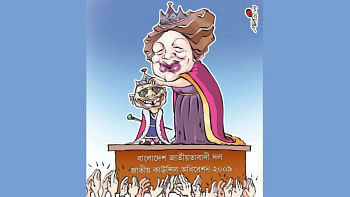Blood-stained Dollars and Euros!
 DOES Bangladesh need blood-stained Dollars and Euros? An emphatic no. It is getting too costly!
DOES Bangladesh need blood-stained Dollars and Euros? An emphatic no. It is getting too costly!
The garment sector has contributed to the country's economy over the past three decades visibly. Today the gross contribution of the sector is about $20 billion annually. The net is about $6 billion after deducting imports by the sector. It has generated more than 3.5 million jobs, and more than eighty percent of those employed are rural poor girls in their teens and twenties.
Those who work in this sector are exploited by their employers, and they do not enjoy the rights and privileges afforded to their counterparts in Europe and North America. In the name of globalisation, free market economy, and competitiveness, the working conditions here are harsh, demanding and unsafe. The workers, especially the women, appear fragile, unnourished and tense. They are underpaid and often not regularly paid. The owners are a new breed of capitalists who could be more humane. There are exceptions, but only a handful.
Frequent accidents like the Rana Plaza disaster, Tazreen fire, or Phoenix and Spectrum collapse are examples of unsafe and hazardous workplace. These are the tip of the iceberg. Hundreds have lost their lives, thousands injured and maimed. These are man-made disasters but certainly avoidable through enhanced compliance. The root is the insatiable greed of the owners with little or no concern for the life and safety of the workers. The sector has no role model of a safe workplace, is not well-regulated, and lacks enforcement of compliance.
Hypnotised by buzzwords like free market economy and globalisation, we have failed to realise that clothes are no longer stitched in New York, London, or Paris, and the textile dyeing and finishing industries of North America and Europe are closed largely because of the stringent compliance requirements of safety at workplace, minimum hourly wage, labour rights, social benefits, health insurance, pension funds, and environmental standards for discharging effluents. Why should it be different for our workers in Bangladesh? Even in China, what was once the booming hub of RMG, the minimum wage at the lowest level is 1500 Yuan a month (about $250) and there is rigid enforcement of environmental requirements. And in the US and Canada, the minimum hourly wage is $7-8.
Why don't the conditions in this sector improve in Bangladesh? Because the government, politicians, businessmen, industrialists, administrators, bureaucrats, professionals and NGOs are strands of the same vicious web of corruption and greed, claiming their portion of the blood-stained pie. They have abdicated their conscience in the name of emancipation, empowerment, and employment without a care for those who are driving the country's economy. Whose economy is it really anyway?
Today those who own these factories and industries also own banks, insurance, shipping, universities, hospitals, malls and so on. Some are lawmakers and proud to walk in the corridor of power and some run NGOs for poverty alleviation. Their business establishments are built and operated by borrowing from the banks with minimum owners' equity. If they go bust, they lose nothing and their opulent life styles will not be compromised.
The RMG factories in particular, in many instances, are housed in buildings that are not built for the purpose. Such buildings include residential commercial buildings or vertical extensions of such existing buildings. The issue of building occupancy is completely disregarded. Designated departments for building inspection and issuance of permits do not enforce compliance, and can be bribed for continuing operations. The same is true for compliance with effluent discharge standards by the textile dyeing and finishing industries.
The buyers from Europe or North America come to Bangladesh not as pilgrims. Rather they are here to maximise their profits. It is of no use blaming them for our unsafe factory floors and low wages. At best, they will send condolences after a tragedy like the Rana Plaza collapse with final fatalities exceeding a thousand souls.
Visit Wal-Mart, Sears, J.C. Penney, and Target stores in the United States and Canada, or similar stores, like Marks & Spencer and Tesco in Europe, to see the price tags placed on clothes stitched in Bangladesh. Even if 2-3 per cent of these prices were given to workers in Bangladesh, none would question whether the Bangladeshi workers were being underpaid and exploited. We now have learnt that payments of salaries, compensations, and treatment and rehabilitation of the workers of the Rana Plaza collapse, pledged by BGMEA and the Bangladesh government, have slowed down. This is certainly a disquieting, and ominous indication of broken promises. Let us hope that the pledges made shall be fulfilled.
My heart bleeds for those girls and boys lost tragically under the beams and slabs of Rana Plaza. And my hats-off to the volunteers who are the symbol of the brave hearts of Bangladesh responding to the call of duty for the cause of humanity. We are proud of you. We salute you all.
The writer is Professor of Chemical Engineering (Retired), BUET, Dhaka, now in Toronto, Canada.
E-mail: [email protected]

 For all latest news, follow The Daily Star's Google News channel.
For all latest news, follow The Daily Star's Google News channel. 



Comments